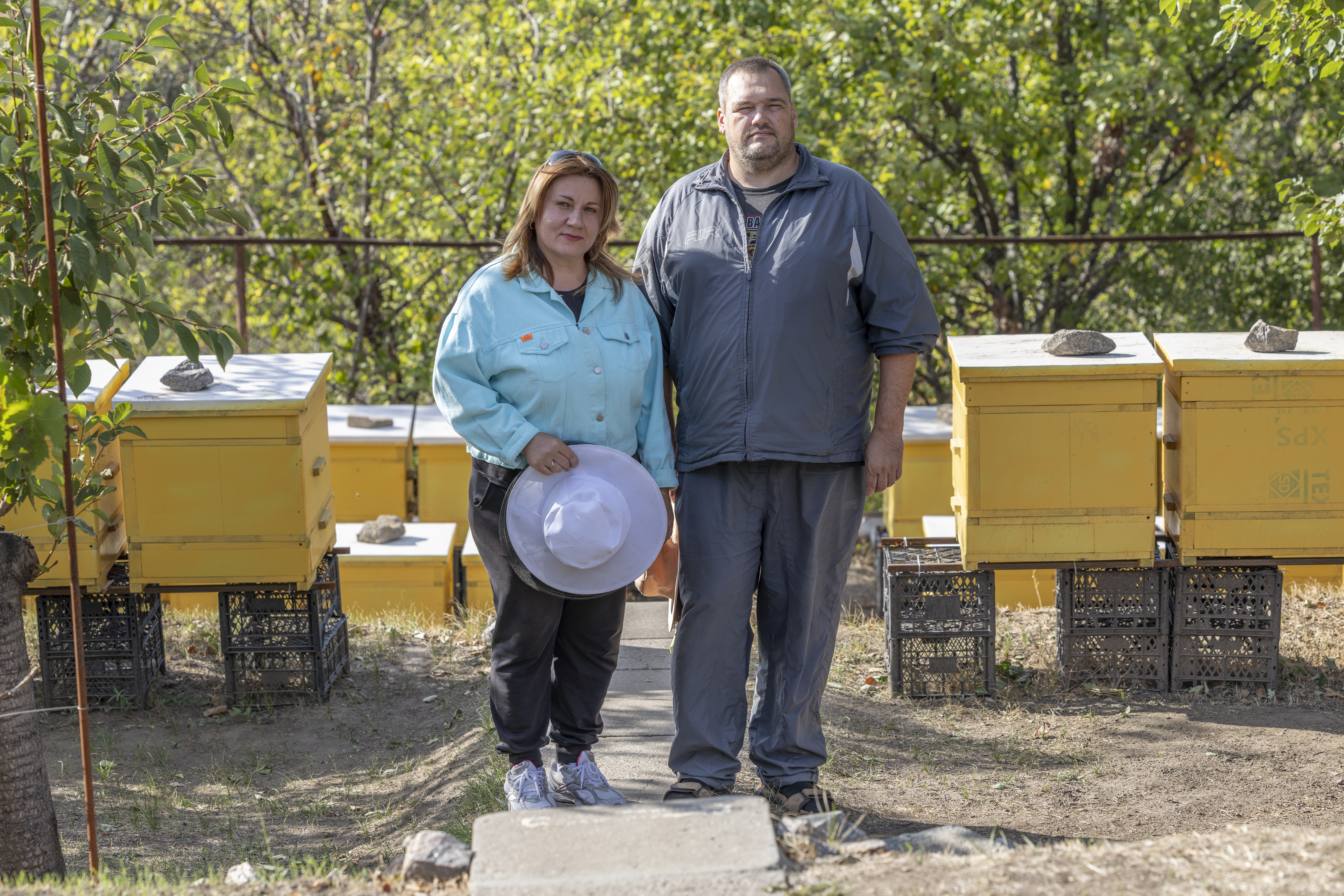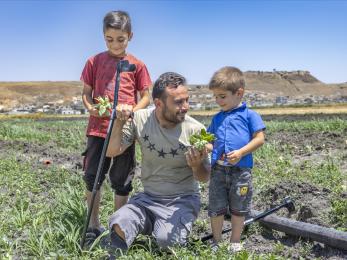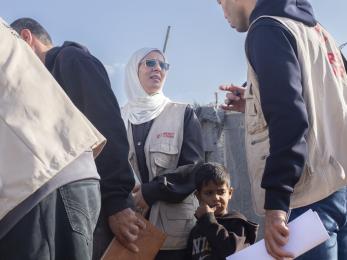Life as a refugee: Spend the day with Nour
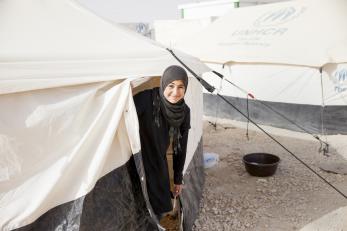
Editor's note: This article was originally published March 14, 2014; it was updated April 28, 2018 to reflect the latest information.
“When we left Damascus, my father told us we would only be gone for a month,” says Nour, a 13-year-old Syrian refugee. “But after we were here for 6 months, I knew we were not going to be going home soon. I was devastated. I thought I had lost my life, my future. I just wanted to die.”
I met Nour after she had been living in Jordan’s Zaatari refugee camp for a year, along with her parents, four siblings, grandmother and cousins. The family fled Syria when bombs started falling in their neighborhood; their house was destroyed just days after they left.
I spent a Friday in the camp with her and her family to see what the life of a refugee is like on a typical day. It was the weekend in Jordan, so Nour, an aspiring nurse, was not in her classes at the Zaatari school. But her school days are similar — living as a refugee in a tent takes a lot more work than her comfortable life in Damascus, and her many chores make it a challenge to keep up with the top scores she earns in her studies.
In spending a day with Nour, I learned that the life of a refugee is very difficult, but it’s also one with occasional joys and moments of tenderness. Nour is a very special girl, as are so many of the Syrian children who are struggling to maintain hope in the face of disaster. As the conflict continues unabated, they deserve our support more than ever.
Scroll through the photos below to learn about the life of a refugee, and find out how Mercy Corps is working to ensure young ones like Nour see a future beyond this crisis.
6:00 AM: Waking up
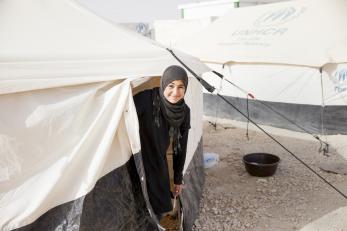
Nour emerges from her tent in Zaatari refugee camp. The sun is shining but winter lingers at this time of year and, at this early morning hour, the air is brisk. The rest of Nour’s family stays nestled in the tent, for now. She gets up before them to go buy bread for the day.
Zaatari is an expanse of plastic tents and metal caravans sheltering tens of thousands of Syrian refugees, all who fled the same violence Nour’s family did. It takes her 15 minutes just to walk to the distribution center, and another 20 minutes to get through the line with others. But this daily journey is a must: Bread is a staple of the Syrian diet and is served at every meal.
7:00 AM: Cleaning the house
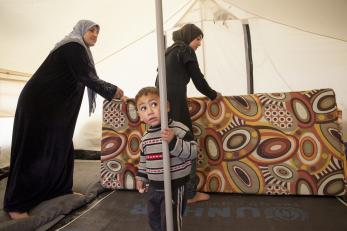
Nour and her mother, Manal, put away the mattresses and blankets so they have space in the tent during the day. The tent is one room measuring just 15 x 12 feet — seven family members live here and use the singular space for sleeping, eating, playing, studying and everything else.
As Nour helps her mother, her little brother, Basheer, tries to stay out of the way. The shelter is small — but safe. Still, the tight quarters make the camp’s community areas, like schools and Mercy Corps’ child-friendly spaces, even more vital. These places give young refugees like Nour a secure place to spend their time and develop relationships outside their family.
7:15 AM: Bathing
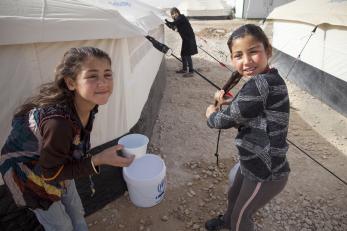
Nour opens the tent flaps for the day, while her sisters Duha (left) and A’laa (right) wash with a bucket of water.
Zaatari sprung up in the middle of the desert 60 kilometers outside Amman, Jordan in 2012, in response to the teeming need of refugees crossing the border from Syria. Tents don’t have individual water taps, and water in Jordan is in short supply.
The camp has a communal bathroom, but the girls can only shower there twice a week. “We have to walk a long way and stand in line to take a cold bucket bath,” Nour explains. “We have to be really fast or people waiting will yell at us.”
In response to water scarcity in Jordan, Mercy Corps built wells in Zaatari and has been working to fix the country’s aging water system so that it can meet the growing needs of refugees and host community members.
Learn more about the water shortage in Jordan ▸
7:30 AM: Getting ready for the day
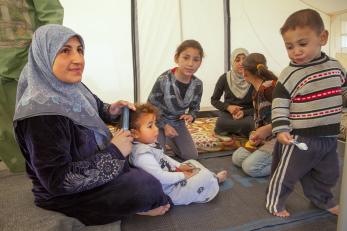
Manal, Nour’s mother, brushes her children’s and niece’s hair every morning. “It is a ritual we have and even being a refugee will not stop this,” she says. “It is one of the few times during the day when we get to sit together and talk.”
Regaining a sense of normalcy is essential for young refugees to heal from painful experiences and be able to move forward. For Nour, this daily tradition with her mother is one of the best times of her day.
8:00 AM: Feeding her little brother
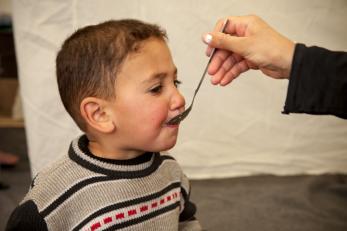
Nour feeds her little brother, Basheer, his breakfast before taking her own. “Feeding Basheer is one of my many full-time jobs,” says Nour. “He is always hungry!”
It’s difficult — or, sometimes, impossible — for Syrian refugees to get work permits in the countries where they've sought refuge, making earning money for food and other essentials incredibly challenging. Many refugee families flee empty-handed and are forced to pursue informal labor or have their children work for a few dollars a day, just so they can make ends meet.
Luckily, in government-run camps like Zaatari, where Nour lives, there are often more resources for refugees to get what they need. Over the years Zaatari has even developed its own economy, complete with makeshift shops and markets carrying a variety of goods.
Throughout the region, Mercy Corps distributes food, cash and basic supplies to help refugees in camps and communities get back on their feet after fleeing. We also support livelihood development through distribution of items like seeds and tools and facilitation of cash grants and business courses.
8:40 AM: Fetching water
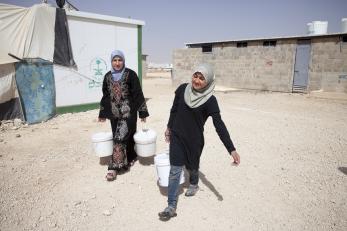
Nour fetches water from the communal water tap in the camp so her family has what they need to drink, bathe, cook and clean. As a refugee, meeting even your most basic needs can be a laborious undertaking: Nour makes this trip an average of six times a day, carrying heavy buckets that leave her sore.
“My father was a mechanic at the Damascus water company before we came here,” she says. “I never would have imagined I’d be walking and standing in line to fill a bucket with water just to survive.”
Before Syria plunged into years-long conflict, many families there led peaceful, happy and productive lives, and people established careers as doctors, teachers, farmers, lawyers and more. Now, those things have been replaced with the daily struggle to find shelter, food and water.
Read more: Who are Syrian refugees? ▸
9:00 AM: Washing dishes
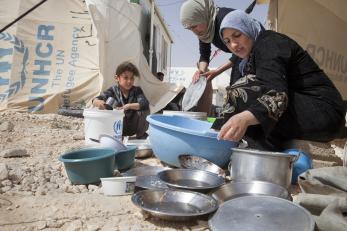
Nour does the breakfast dishes with her mother and little sister A’laa. They wash the dishes behind their tent in plastic buckets, as there are no sinks. “It is really hard to get things clean here without hot water,” says Nour. “Even if you manage to get all the grease off, you end up with sand on the plates.”
Many of the camps, communities and settlements where Syrian refugees have sought refuge are crowded and derelict, and almost none have the resources to support such an influx of people. These conditions can make the life of a refugee precarious. Without proper water, hygiene and sanitation systems, refugees are more vulnerable to disease. They also have limited or no access to medical care if they do get sick.
Mercy Corps works in camps and communities to deliver emergency water, build latrines and improve sanitation systems to ensure refugees are supported to stay healthy and safe.
10:00 AM: Caring for her younger siblings
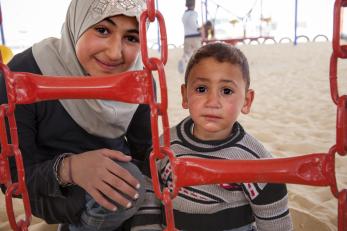
Finished with her morning chores, Nour goes to the playground with her siblings. As the eldest, she must look after her younger siblings, but she still enjoys the short break from housework. The family lives just a couple minutes walk from one of Mercy Corps’ child-friendly spaces equipped with slides, merry-go-rounds, swings and climbing bars. A Mercy Corps staff member on duty monitors the kids.
With so many young refugees out of school and suffering from the immense stress of war, child-friendly spaces provide something essential: a place for them to be kids. The centers provide games and activities — sports, crafts, computer classes — carefully planned to help young refugees make friends, cope with their experiences and continue their healthy development.
11:00 AM: Going to the market
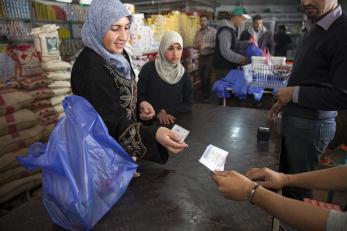
Nour and her mother walk 30 minutes across the camp to buy food. Zaatari fills two square miles of desert land and, with a population of nearly 80,000, has developed into one of Jordan’s largest cities.
Nour’s family receives twice-monthly food vouchers for 18 Jordanian Dinars (about $25 USD) that they have to use at an UNHCR-approved market in the camp. They buy beans, rice, ghee (similar to butter) and canned goods, because they don’t have any refrigeration to keep fresh food from spoiling.
12:30 PM: Cooking lunch
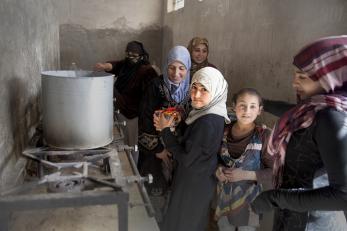
Nour helps her mother cook lunch, the largest meal of the Syrian diet. They have to use the communal camp kitchen that serves 40 families. One of Nour’s sisters usually goes ahead to wait in line — there are only 16 gas stoves to share — while Nour and her mother assemble the food in the tent and then carry it all to the communal kitchen for cooking.
2:30 PM: Eating with family
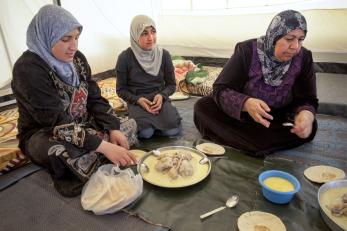
Lunch is served. Nour sits with her mother and grandmother. Friday is the one day the family can serve meat, as it is too expensive to eat regularly. Nour helped her mother cook a typical Syrian dish made with chicken, raisins, rice, bulgar wheat and yoghurt. “In Syria, we ate this almost every day,” she says. “I never thought I would miss it, but now I wait all week for Friday.”
Facing stretched resources and few income opportunities, many refugees report not being able to buy the food they need for their families. Today millions of Syrians across the region are living in poverty and hunger.
3:30 PM: Preparing tea
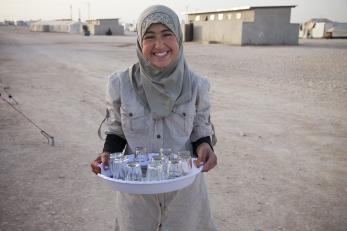
Nour prepares tea for her family and other relatives who live in the camp and have come by to visit. “They always talk about the war and friends who have been killed or disappeared," says Nour. "It makes me sad to listen and think about how my country is being destroyed.”
In years of war, communities inside Syria have been reduced to piles of charred rubble that feel impossible to return to. Syrians who have fled face an uncertain future as months away from home gradually bleed into years. And now, as refugees, they must face not only the challenge of rebuilding the life that is in front of them, but of holding onto the life they left.
More stories about refugees’ struggle to balance the past and the future ▸
Resting
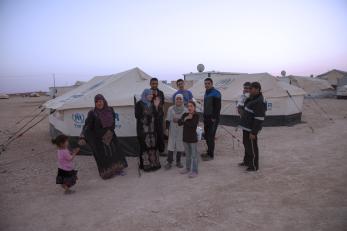
Nour joins her family and neighbors outside as dusk approaches. She enjoys a rare moment of quiet in the camp that is usually teeming with people and water trucks. “On Friday evening it’s always peaceful. Sometimes I almost forget I am a refugee,” she pauses. “But it doesn’t last long, and then I have to go get more water.”
How you can help
Mercy Corps is working hard to relieve the intense suffering of civilians inside Syria, as well as that of refugees seeking safety in neighboring countries.
For young Syrian refugees like Nour, this work can mean the difference between a life of despair and a future of hope. And it relies on the compassion and kindness of people like you.
We’ve worked in the region for 20 years and are committed to helping young Syrians and the countries hosting them for as long as it takes. As the number of those in need keeps increasing, your support will allow us to do even more for young refugees.
